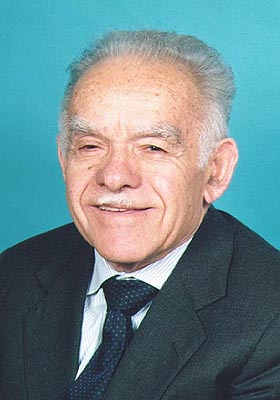Yitzhak Shamir
|
| “ | I believe that the will of the people is resolved by a strong leadership. Even in a democratic society, events depend on a strong leadership with a strong power of persuasion, and not on the opinion of the masses. | „ |
| ~ Yitzhak Shamir |
Yitzhak Shamir (Hebrew: יצחק שמיר; born Yitzhak Yezernitsky; October 22, 1915 – June 30, 2012) was an Israeli politician and the seventh Prime Minister of Israel, serving two terms, 1983–84 and 1986–1992.
Before the establishment of the state of Israel, Shamir was a leader of the Zionist militant group Lehi. After the establishment of the Israeli state he served in the Mossad between 1955 and 1965 and as a Knesset Member. He served as the 6th Speaker of the Knesset and as Foreign Affairs Minister. Shamir was the country's third-longest-serving prime minister after David Ben-Gurion and Benjamin Netanyahu.
Biography[edit]
Yitzhak Yezernitsky (later Yitzhak Shamir) was born in the predominantly Jewish village of Ruzhany, Grodno province, Russian Empire (now Belarus), which after World War I returned to Poland, as the son of Perla and Shlomo, owner of a leather factory. Those close to Shamir noted that "he often recalls his childhood and youth in Belarus." Shamir later moved to Białystok, Poland, and studied at a Hebrew high school network.
His parents and two sisters died during the Holocaust. Shamir claimed his father was killed just outside his birthplace in Ruzhany by villagers who had been his childhood friends, after he had escaped from a German train transporting Jews to the Nazi's death camps, though this was never confirmed. His mother and a sister died in the concentration camps, and another sister was shot dead.
Shamir joined the Beitar Zionist youth movement as a young man and studied law in Warsaw. He immigrated to Palestine in 1935 and enrolled at the Hebrew University in Jerusalem. There he joined the Irgun Zvai Leumi (IZL) underground movement; and in 1940, following a policy split in the IZL, he joined the Israel Freedom Fighters (IFF), a terrorist group later known as the Stern Gang (after its founder, Avraham Stern).
Following the death of Stern, Shamir played a central part in reorganizing the Sternist Central Committee. Shamir was arrested by the British-mandate authorities in 1941 and 1946. After his second escape from internment, he made his way to France, where he was granted asylum. He returned to Israel in May 1948 and then served as a Mossad secret-service operative in Europe until 1965.
After engaging in private commerce for a time, he joined Menachem Begin’s Herut movement, which in 1973 joined with other smaller parties to form the Likud. In March 1975 Shamir was elected chairman of the party executive of Herut. First elected to the Knesset (Israeli parliament) in 1973, he became speaker of the Knesset after the Likud’s electoral victory in 1977.
Begin, as prime minister, appointed Shamir to be minister of foreign affairs in March 1980. In September 1983 the Likud Party elected Shamir to succeed the retiring Begin as its new leader, but he lost the prime ministry in the indecisive elections of July 1984.
In September 1984 Shamir, the Likud hardliner, and Shimon Peres, head of the Labour Party, formed a makeshift coalition government in which Peres served as prime minister for the first half of a 50-month term and Shamir served as deputy prime minister and foreign minister; the roles were reversed for the second 25 months, and Shamir thus assumed the office of prime minister in October 1986.
After similarly indecisive elections in 1988, the Likud and Labour parties formed another coalition government, with Shamir as prime minister. In 1990, after his government fell, Shamir eventually succeeded in forming his own coalition government (without Labour), including several representatives of ultraconservative groups. In the general elections of 1992, the Likud lost and Shamir’s government fell.
In 2004, Shamir's health declined, with the progression of his Alzheimer's disease, and he was moved to a nursing home. The government turned down a request by the family to finance his stay at the facility.
Shamir died on the morning of June 30, 2012, at a nursing home in Tel Aviv where he had spent the last few years as a result of the Alzheimer's disease he had suffered since the mid-1990s. He was given a state funeral, which took place on July 2 at Mount Herzl, Jerusalem, and was buried beside his wife, Shulamit, who had died the previous year.
- Modern Villains
- Deceased
- Prime Ministers
- Judaism
- Israel
- Elderly
- Corrupt Officials
- Extremists
- War Criminal
- Terrorists
- Jingoists
- Imprisoned
- Military
- Murderer
- Assassins
- Mastermind
- Master Manipulator
- Wrathful
- Vengeful
- Xenophobes
- Supremacists
- Grey Zone
- Anti - Villain
- On & Off Villains
- Redeemed
- Evil vs. Evil
- Fascist
- Irony
- Hypocrites
- Mongers
- Arrogant
- Honorable Villains
- Islamophobes
- Cold war villains
- Israeli-Palestinian Conflict Villains
- Lawful Evil
- Middle Eastern Villains
